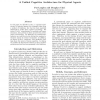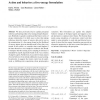46 search results - page 5 / 10 » Predicting the expected behavior of agents that learn about ... |
JIRS
2000
13 years 6 months ago
2000
Agents (hardware or software) that act autonomously in an environment have to be able to integrate three basic behaviors: planning, execution, and learning. This integration is man...
NIPS
2008
13 years 8 months ago
2008
Young children demonstrate the ability to make inferences about the preferences of other agents based on their choices. However, there exists no overarching account of what childr...
IDEAL
2004
Springer
14 years 2 days ago
2004
Springer
Most financial time series processes are nonstationary and their frequency characteristics are time-dependant. In this paper we present a time series summarization and prediction ...
AAAI
2006
13 years 8 months ago
2006
In this paper we describe Icarus, a cognitive architecture for physical agents that integrates ideas from a number of traditions, but that has been especially influenced by result...
BC
2010
13 years 4 months ago
2010
We have previously tried to explain perceptual inference and learning under a free-energy principle that pursues Helmholtz's agenda to understand the brain in terms of energy ...


